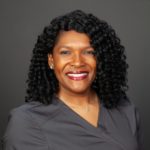A cancer diagnosis is challenging for many reasons, and each patient has a unique set of obstacles and hurdles to overcome during their cancer journey. At Mary Bird Perkins Cancer Center, a team of experts – oncologists, nurses, dieticians and patient navigators – work collaboratively to ensure the best course of treatment for each patient and provide any additional resources needed.
Adequate nutrition and hydration are key factors for successful treatment of all cancer patients. “Food is fuel.” “Eat to heal.” These may seem like simple concepts to understand; however, it’s not always so easy to integrate the proper nutrition into a patient’s diet. This is especially true when the effects of radiation therapy and chemotherapy impact the body’s physiology, all the way down to taste buds.
Altered taste is a major challenge that patients with head and neck cancer often encounter. It has a huge impact on their quality of life and how they respond to food and supplemental sources of nourishment.
Favre Award for Innovation Enhances Quality of Life
When patients aren’t able to maintain nutrition and hydration it can lead to weight loss, missed treatments, emergency room visits, the need for IV hydration or feeding tube placement. These can have significant negative impacts on treatment outcomes.
Our team wanted to look at the effects of radiation therapy, with or without chemotherapy, on taste, salivary and swallowing function in head and neck cancer patients. The goal of this research was to provide better nutritional recommendations. In 2018, this project idea won the Favre Family Award for Innovation and received a grant to conduct the study.
This annual award, spearheaded in 2016 by a generous donation from philanthropist Art Favre, encourages Mary Bird Perkins team members to cultivate their creativity and submit ideas for ground‐breaking solutions aimed at benefitting patients throughout the Gulf South region. Each grant proposal competes for a $15,000 award to turn the idea into a reality.
A Taste of Change: Answers for Head and Neck Cancer
Up to 66 percent of head and neck cancer patients require feeding tubes during their course of treatment. There are various reasons a feeding tube becomes necessary: some patients experience trouble swallowing, while others have difficulty tasting food and simply won’t eat.
After investigating sensory changes and how patients’ taste buds were affected, our study looked at how these issues related to swallowing function for patients. If clinicians know when major changes start to happen, there is more opportunity to provide support.
Looking at a baseline of sensory changes and how patients’ taste buds are affected with five main taste compounds (sweet, sour, salty, bitter, umami) we can now pinpoint when the impacts occur. For example, we can confidently point to a specific time within treatment when a patient will likely become sensitive to salty foods, allowing us to recommend avoiding certain items. This knowledge provides clinicians more options for solving nutrition‐related problems while also helping to ensure the patient has a better relationship with food.
Focusing on oral care and taste enhancing options, like adding chocolate syrup to a dish, also increases palatability of foods. The better food tastes, the more likely the patient will continue to eat. This improves overall nutritional health and reduces the need for feeding tubes during the radiation therapy process, ultimately increasing the patient’s quality of life and treatment outcomes.
The Favre Family Award for Innovation gave our team the opportunity to directly address a problem and be part of a forward‐thinking solution. Continuing this research provides us with even more specific options for patients in the future.
Having foods that already meet the altered taste needs of patients removes a barrier to treatment. Our focus is always on meeting their individual needs for the best outcomes possible. This helps to further our mission of improving survivorship and lessening the burden of cancer.
All Mary Bird Perkins Cancer Center team members are eligible and encouraged to submit their innovative ideas. Learn more about the Favre Family Award for Innovation and submit your idea at marybird.org/favre‐award/.

